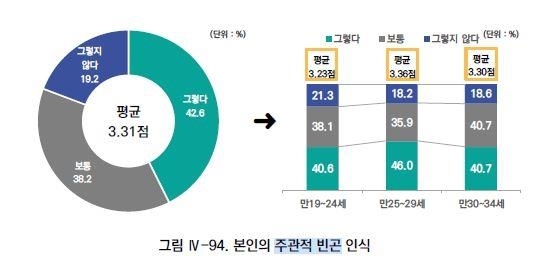 |
A screenshot of graph showing how young people think of their wealth status (National Youth Policy Institute) |
Four out of 10 young Koreans consider themselves poor, citing familial transfer of wealth as a key factor aggravating the social divide, data showed Sunday.
According to data from National Youth Policy Institute, 42.6 percent of 4,114 respondents aged between 19 and 34 said they think they’re are poor and of those, some 34.3 percent answered they believe that they won’t be able to get out of poverty. Only some 28.5 percent said they think they can.
Some 41.4 percent said they earned less than 20 million won ($16,700) a year, followed by income bands between 20 million to 40 million won, 40 million to 60 million won and more than 60 million won. Nearly 50 percent of the respondents said they were not satisfied with their income.
In terms of housing, some 63.9 percent said they don’t own their own houses or have no financial capacity to sign a lease or jeonse contract. Jeonse refers to a two-year lease in which tenants pay landlords a lump-sum deposit and get it back when they move out.
Some 54 percent of those who are homeowners or signed lease or jeonse answered they had received financial support from their parents or relatives.
When asked about investment options, some 53 percent said they were investing in stocks, bonds and funds, while 21.7 percent answered they are trading cryptocurrency.
Of those who are making high-risk investments including stocks and cryptocurrency, 39.6 percent said they are carrying out long-term asset management plans through those investments. Others answered they are seeking to get a short-term return and expand their investment experience.
Of respondents who have bank loans, over one-third said they needed the money to cover housing costs, while others said they needed them for living expenses and college fees.
“Data shows that young people are facing severe inequality problems sparked by the real estate price surge and widening wealth gap, with some parents transferring their assets to children,” the state-run policy institute said.
When asked about the survey result, Chung Sang-hoon, a 32-year-old Seoulite, echoed concerns that buying a house in Seoul has become nearly “a myth.”
“Since I can’t expect much financial support from my parents, I plan to keep on investing in stocks and cryptocurrency instead of just saving up in the bank,” Chung said.
“It might take at least another five to six years to pay for a jeonse in a Seoul apartment, let alone even consider getting married.”
By Byun Hye-jin (
hyejin2@heraldcorp.com)







![[Today’s K-pop] Blackpink’s Jennie, Lisa invited to Coachella as solo acts](http://res.heraldm.com/phpwas/restmb_idxmake.php?idx=644&simg=/content/image/2024/11/21/20241121050099_0.jpg)
